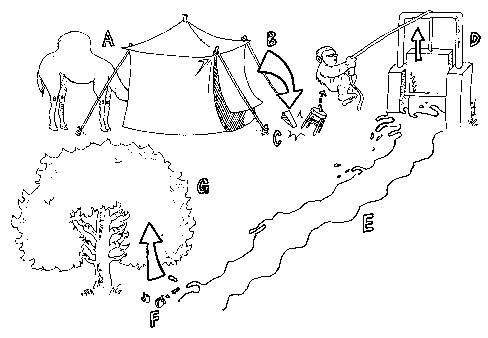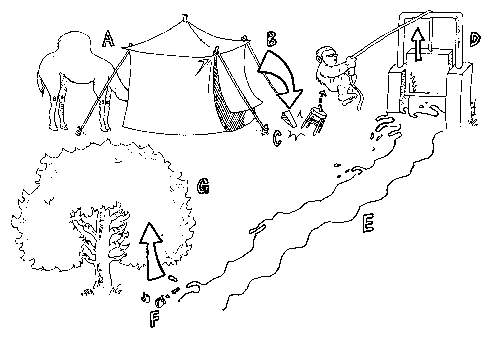
Swept Away On The Slippery Slope
08/04/2007
Eugene Volokh has a note on an article about "Slippery Slopes" here, and it reminded me that Volokh’s own law review article on Slippery Slopes[Mechanisms of the Slippery Slope, Harvard Law Review, Vol. 116, February 2003(PDF) ] has one of the funnier cartoons seen in a law review article 
Camel (A) sticks his nose under the tent (B), which collapses, driving the thin end of the wedge (C) to cause monkey to open floodgates (D), letting water flow down the slippery slope (E) to irrigate acorn (F) which grows into oak (G). The argument is irrefutable.
But the rest of the article is more serious. I searched for "immigration" where the slope has been getting more and more slippery for years, and found this:
Types of Political Power Slippery SlopesDecision A may change the political balance in several different ways.
1. Decisions to change the voting rules (such as rules related to voter eligibility, ease of registration, apportionment, or supermajority requirements) may lead to more changes in the future. For instance, if noncitizen immigrants tend to support broader immigration, and oppose laws excluding noncitizens from benefits, then letting such noncitizens vote (A) may lead to more benefits for noncitizens, and more immigration (B).
2. Decisions that change the immigration or emigration rate could also lead to political power slippery slopes. This is true for both international migration and interstate and inter-city migration, and for both actual migration rules and any decision that makes migration more or less appealing. Allowing more residential development in a rural area (A), for instance, may lead to more policy changes (B), as migration from urban areas changes the political makeup of the rural area.
See the articles Electing a New People and Swept Away, By Peter Brimelow and Edwin S. Rubenstein for a discussion of that slippery slope. If you're wondering where a potential North American Union might lead, look at some our writings on the European Union. Slippery slopes are real.
